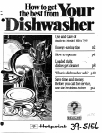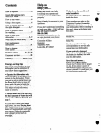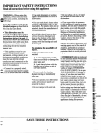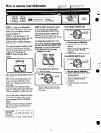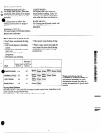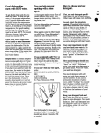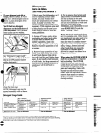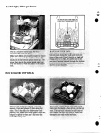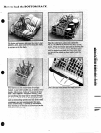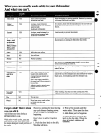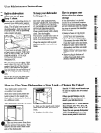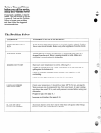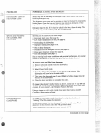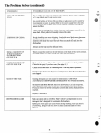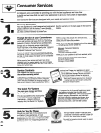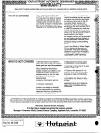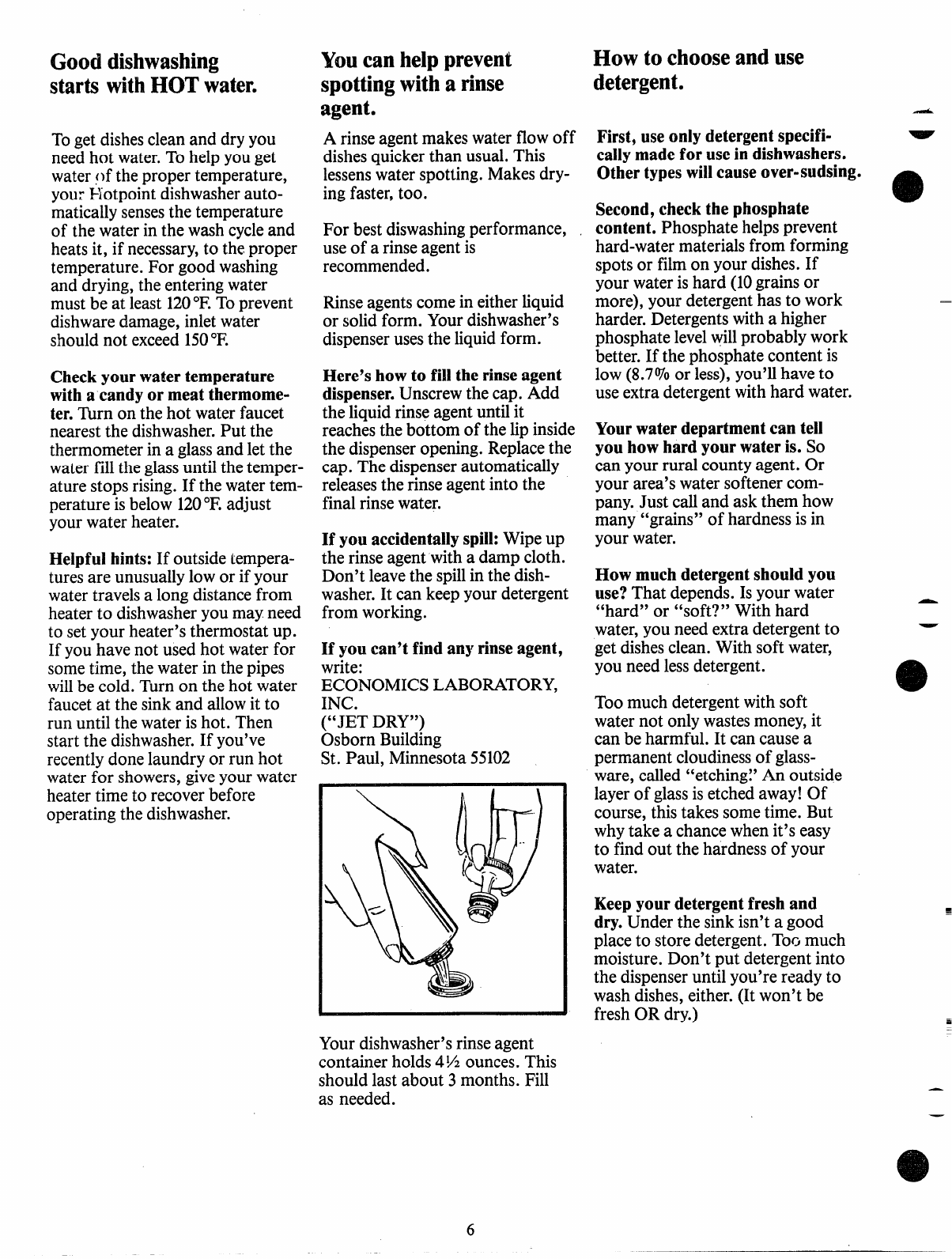
Gooddishwashing
startswithHOTwater.
Togetdishescleanand dry you
needhot water.Tohelpyouget
waterf~fthe proper temperature,
your ~otpoint dishwasherauto-
maticallysensesthe temperature
of the waterin the washcycleand
heatsit, if necessary,to the proper
temperature.For good washing
and drying,the enteringwater
mustbeat least 120‘F.Toprevent
dishwaredamage,inletwater
shouldnot exceed150‘F.
Checkyourwatertemperature
witha candyormeatthermome-
ter.~rn on the hot water faucet
nearestthe dishwasher.Put the
thermometerin a glassand let the
water fillthe glassuntil thetemper-
ature stops rising.If thewater tem-
perature is below 120‘F.adjust
your water heater.
Helpfulhints:If outside tempera-
turesare unusuallylowor if your
watertravelsa long distancefrom
heaterto dishwasheryou mayneed
to setyour heater’sthermostat up.
If you havenot used hot water for
sometime, the water in the pipes
willbe cold. Turn on the hot water
faucetat the sinkand allowit to
run until the wateris hot. Then
start the dishwasher.If you’ve
recentlydone laundry or run hot
water for showers,giveyourwater
heatertime to recoverbefore
operatingthe dishwasher.
Youcanhelpprevent
spottingwitha rinse
agent.
A rinseagentmakeswater flowoff
dishesquickerthan usual.This
lessenswaterspotting.Makesdry-
ing faster,too.
For bestdiswashingperformance,
useof a rinseagentis
recommended.
Rinseagentscomein eitherliquid
or solidform. Yourdishwasher’s
dispenserusesthe liquidform.
Here’showto fill therinseagent
dispenser.Unscrewthe cap. Add
the liquidrinseagentuntilit
reachesthe bottom of the lipinside
the dispenseropening.Replacethe
cap. The dispenserautomatically
releasesthe rinseagentinto the
final rinsewater.
If youaccidentallyspill:Wipeup
the rinseagentwitha damp cloth.
Don’t leavethe spillin the dish-
washer.It can keepyour detergent
from working.
If youcan’tfind anyrinseagent,
write:
ECONOMICSLABOWTORY,
INC.
(“JET DRY”)
Osborn Building
St. Paul, Minnesota55102
How to chooseanduse
detergent.
First,useonlydetergentspecifi-
callymadefor useindishwashers.
Othertypeswillcauseover-sudsing.
Second,checkthephosphate
o
content.Phosphate helpsprevent
hard-watermaterialsfrom forming
spotsor filmon your dishes.If
your waterishard (10grainsor
more), your detergenthas to work
harder.Detergentswith a higher
phosphatelevelwillprobablywork
better.If the phosphatecontent is
low(8.7V0or less),you’llhaveto
useextradetergentwithhard water.
Yourwaterdepartmentcantell
you howhardyourwateris. So
can your rural countyagent. Or
your area’swatersoftenercom-
pany.Just calland ask them how
many “grains” of hardnessis in
your water.
How muchdetergentshouldyou
use?That depends. Isyour water
~~h~d”or c~soft?”With hard
~
water,you need extradetergentto
-
getdishesclean.With soft water,
you needlessdetergent.
Too muchdetergentwith soft
—
water not onlywastesmoney,it
can be harmful. It can causea
permanentcloudinessof glass-
ware, called“etching?’An outside
layerof glassis etchedaway! Of
course, thistakes sometime. But
whytake a chancewhenit’s easy
to find out the hardnessof your
water.
Keepyourdetergentfreshand
dry.Under the sink isn’ta good
placeto store detergent.Toomuch
moisture. Don’t put detergentinto
the dispenseruntilyou’reready to
wash dishes,either.(It won’t be
fresh OR dry.)
—
❑
✎
Yourdishwasher’srinseagent
containerholds4l/zounces.This
should last about 3 months. Fill
as needed.
—
—



